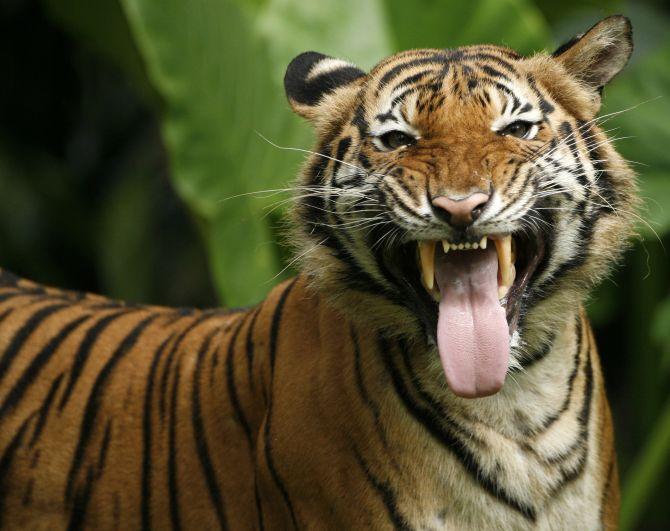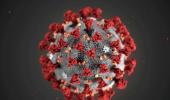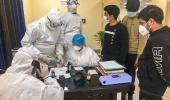The Central Zoo Authority (CZA) on Monday put all zoos across the country on 'highest' alert and asked them to collect samples fortnightly in suspected cases after a tiger at a United States zoo tested positive for coronavirus.

In a letter to all states and Union territories, CZA Member Secretary S P Yadav said the United States Department of Agriculture's National Veterinary Services Laboratories has confirmed COVID-19 in a tiger at the Bronx Zoo in New York.
'Zoos in the country are, therefore, advised to remain on highest alertness, and monitor animals 24X7 using CCTVs for any abnormal behaviour or symptoms,' it said.
The authority said carnivores, especially cats, ferrets and primates, need to be carefully monitored and fortnightly samples of suspected cases be sent to designated animal health institutes for COVID-19 testing.
The samples can be sent to the National Institute of High Security Animal Disease in Bhopal, the National Research Centre on Equines in Haryana's Hisar and the Indian Veterinary Research Institute in Bareilly, Uttar Pradesh, the letter said.
'Sick animals should be isolated and quarantined,' it added.
No keeper or handler should be allowed in the vicinity of animals without safety gear, preferably personal protective equipment (PPE).
They should have least contact with animals while providing them feed, it said.
Zoos have been asked to follow all bio-containment and safety measures required to handle the high-risk pathogen as per the national/Indian Council of Medical Research guidelines, the letter said.
'Zoos are advised to coordinate with designated nodal agencies of the government for public health response and permit screening, testing and surveillance as and when required by the nodal agency,' the CZA added.
A four-year-old Malayan tiger at the Bronx Zoo in New York has tested positive for the coronavirus infection.
The female tiger, named Nadia, is believed to be the first known case of an animal infected with COVID-19 in the US. It is suspected that she contracted the virus from a caretaker who was asymptomatic at that time.
The incident has raised concerns over whether the infection can be transmitted between animals and humans.
According to media reports, a Pomeranian dog in Hong Kong also tested positive for COVID-19 last month.
So far, the SARS-CoV-2 virus has been spreading from humans to humans and there is no research yet to support human-to-animal transmission, experts say.
Still, they say, people infected with COVID-19 should limit contact with their pets.
The Union Environment Ministry also issued an advisory to states and Union territories, expressing concern about the transmission of the virus between humans and animals.
It asked the states and UTs to take immediate preventive measures, reduce human-wildlife interface and restrict the movement of people to national parks, sanctuaries and tiger reserves.
Zoos across the country have been shut following a CZA directive on March 13, with their administration taking precautionary measures while taking care of animals.
In India, there are 145 recognised zoos with over 56,000 animals, according to the CZA.
The Delhi Zoo or the National Zoological Park has asked its staff with symptoms such as cough, cold, fever to stay home.
"We have been screening our employees at the gates. If they show any symptoms, they are asked to quarantine themselves at home," Delhi Zoo Director Suneesh Buxy said.
The zoo staff has been taking all precautionary measures. They wear gloves, masks and wash hands with soap frequently, Range Officer Saurabh Vashishtha said, adding that disinfectant is being sprayed in common areas.
There are around 1,100 animals, 30 attendants and around 15 animal keepers in the 188-acre zoo, he said.
The authorities at the Itanagar Biological Park are also taking extra care of their nine big cats.
"Food for the carnivores is treated properly before the animals eat it. Even the vehicles are sanitised thoroughly," Biological Park, Itanagar, curator Raya Flago said.
The zoo administration has not allowed any employee to go out of the park since the lockdown came into force.
"We have also made it mandatory for the staff of the park to wear masks and other protective equipment while feeding the animals," Flago added.
Observe tigers and report if they develop COVID-19 symptoms: NTCA to tiger-range states
India's apex tiger conservation body has also swung into action and has asked all tiger-range states to keep an eye on the big cats and immediately report to authorities if any of them is found having COVID-19 symptoms.
The National Tiger Conservation Authority alerted chief wildlife wardens of all tiger range states shortly after the Union Environment Ministry advised states to curb human visits and movements in national parks and wildlife sanctuaries as precautionary measures against the transmission of infection from humans to animals.
It asked them to gear up frontline staff as well as veterinary officials to prevent the spread of the disease among tigers owing to the zoonotic nature of COVID-19.
Asked about the issue, a senior official of the ICMR said, "There is low probability of transmission of COVID-19 from animal to human."
Vaibhav C Mathur, NTCA's Assistant Inspector General of Forests said, "I am directed to inform that owing to the communicable and zoonotic nature of the said disease, following actions need to be taken to avert the disease in wild tigers in India.
"Tigers may be observed for symptoms consistent with COVID-19 such as respiratory signs of nasal discharge, coughing and laboured breathing through direct observation to the extent possible, besides through camera trap images for visible symptoms," said .
He also said it should be ensured that 'personnel handling tigers in human-tiger negative interactions and translocation operations be ascertained to be coronavirus negative'.
They should also take due precaution as advised by the Ministry of Health and Family Welfare from time to time, he added.
"For COVID-19 diagnosis as well as differential diagnoses and characterization as highlighted above, samples may be sent to ICAR-approved laboratories as per the enclosure," he added.











 © 2025
© 2025